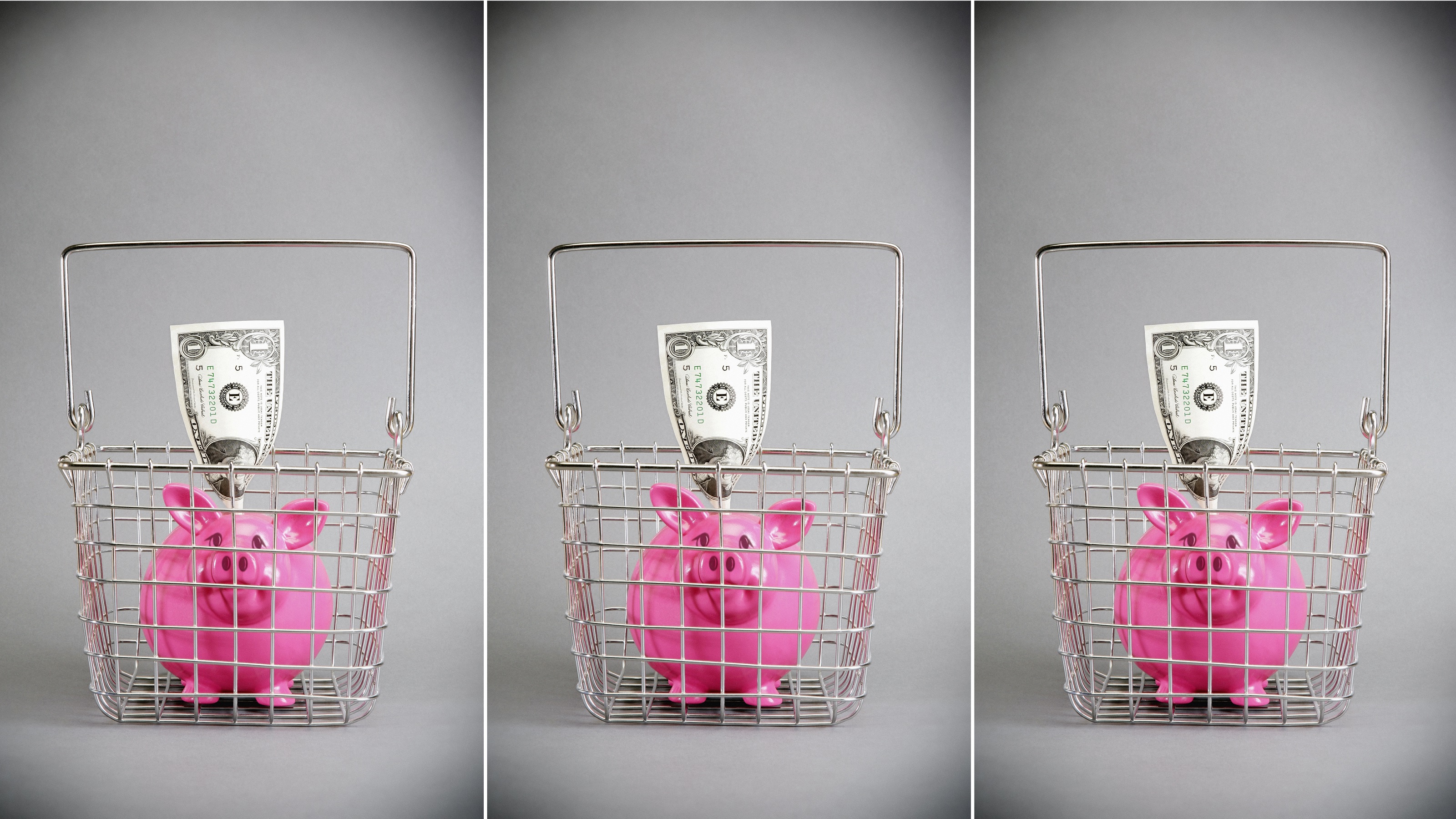In Retirement, Put Your Eggs in These Three Baskets
Dividing your money this way can help ensure you don’t run out during the many years you spend happily retired.


Profit and prosper with the best of Kiplinger's advice on investing, taxes, retirement, personal finance and much more. Delivered daily. Enter your email in the box and click Sign Me Up.
You are now subscribed
Your newsletter sign-up was successful
Want to add more newsletters?

Delivered daily
Kiplinger Today
Profit and prosper with the best of Kiplinger's advice on investing, taxes, retirement, personal finance and much more delivered daily. Smart money moves start here.

Sent five days a week
Kiplinger A Step Ahead
Get practical help to make better financial decisions in your everyday life, from spending to savings on top deals.

Delivered daily
Kiplinger Closing Bell
Get today's biggest financial and investing headlines delivered to your inbox every day the U.S. stock market is open.

Sent twice a week
Kiplinger Adviser Intel
Financial pros across the country share best practices and fresh tactics to preserve and grow your wealth.

Delivered weekly
Kiplinger Tax Tips
Trim your federal and state tax bills with practical tax-planning and tax-cutting strategies.

Sent twice a week
Kiplinger Retirement Tips
Your twice-a-week guide to planning and enjoying a financially secure and richly rewarding retirement

Sent bimonthly.
Kiplinger Adviser Angle
Insights for advisers, wealth managers and other financial professionals.

Sent twice a week
Kiplinger Investing Weekly
Your twice-a-week roundup of promising stocks, funds, companies and industries you should consider, ones you should avoid, and why.

Sent weekly for six weeks
Kiplinger Invest for Retirement
Your step-by-step six-part series on how to invest for retirement, from devising a successful strategy to exactly which investments to choose.
Let’s say that your retirement is now around the corner. You’ve heard theories on what you should do in retirement. You have saved and saved and now … You have to make a change and start spending.
Dick Van Dyke has been quoted as saying, “I found out retirement means playing golf, or I don’t know what it means. But to me, retirement means doing what you have fun doing.”
This is a mindset shift that may be helpful for those who are uncertain about the future. As you focus on retirement, think about retiring to something, not retiring from something.
From just $107.88 $24.99 for Kiplinger Personal Finance
Become a smarter, better informed investor. Subscribe from just $107.88 $24.99, plus get up to 4 Special Issues

Sign up for Kiplinger’s Free Newsletters
Profit and prosper with the best of expert advice on investing, taxes, retirement, personal finance and more - straight to your e-mail.
Profit and prosper with the best of expert advice - straight to your e-mail.
Many people do the right thing by planning for their retirement well ahead of time. But when they think of having to start using their retirement money, nagging questions persist because there are some uncertainties in retirement, such as inflation, tax rates, market volatility and health issues. Am I going to have enough money to retire? Am I going to outlive my assets?
Whenever you start considering those questions, it makes sense to start making a plan. I suggest that you put together three different baskets for your retirement money.
1. Cash basket
This basket is for short-term needs — for the unplanned expenses, which often feel like they hit at the worst times. At a minimum, it’s prudent to have three to six months of living expenses available in case of emergencies, such as car repairs, a broken appliance, leaky roof, etc.
Building a sizable cash basket or emergency fund well before retirement is a must, allowing you to handle these bad breaks without dipping into retirement savings or taking out loans. Maintaining an emergency fund in retirement is just as important.
One vehicle you can use as a cash basket is a savings account. Ideally, this account would be linked to your checking account. The money should be kept safe and liquid so it is readily available, and it should be tapped only for true emergencies.
Get in the habit of replenishing the account if you draw on the funds. You can also utilize a certificate of deposit (CD). You will incur penalties for taking the money out before the CD matures, but the penalty will not take away from the principal amount deposited. You will receive a much better interest rate and usually come out on top even if you do need to take the funds out early.
2. Income basket
With people generally living longer, you’re possibly going to have at least 15 to 20 years of retirement. The income basket is where you want to have guaranteed, stable income when you’re no longer drawing a paycheck. It is important to have clear goals in place when setting up your income basket. I had grandparents who retired and traveled the world. I also had a grandparent who worked part-time to get out of the house. Your plan will look very different if you are going to travel or engage in other activities that are greatly affected by inflation.
If you want to participate in activities where costs are volatile, you are going to need to look at income options that will give you more flexibility. For example, you may want to consider a bond mutual fund portfolio, short-term government bonds and variable annuities.
If you are planning on spending your retirement on things that are more controlled with lower costs, you can utilize income options with less flexibility. For example, you may want to consider long-term government bonds, high-grade bonds and fixed annuities.
It is important to have a runway in the income bucket of six to 10 years, thus allowing time for the growth bucket to recover in the event of an extended bear market.
3. Growth basket
Once you have figured out what you are going to need to live out your retirement, you can focus on getting a higher rate of return on the remaining funds. When you know your income is taken care of, you can afford to take a risk with some assets. For example, you may want to consider investing in individual stocks, equity/stock mutual funds and international investments. The key to success in the stock market is not selling when things start to drop. Knowing your income is secure makes it easier to stay invested and allows for your growth basket to recover.
Retirement means doing what you have fun doing. That’s hard to do if you’re frequently worried about having enough money. For many people, that’s their biggest retirement concern. Like the old saying goes, don’t put all your eggs in one basket. Actively planning and proportioning money in these three baskets can help alleviate those financial concerns.
Dan Dunkin contributed to this article.
The appearances in Kiplinger were obtained through a PR program. The columnist received assistance from a public relations firm in preparing this piece for submission to Kiplinger.com. Kiplinger was not compensated in any way.
Related Content
- Five Things I Wish I’d Known Before I Retired
- Retirees’ Anti-Bucket List: 10 Experiences You Don’t Want
- Do You Have at Least $1 Million in Tax-Deferred Investments?
- The Four Headwinds of Retirement and How to Combat Them
- To Create a Happy Retirement, Start With the Three Ps
Profit and prosper with the best of Kiplinger's advice on investing, taxes, retirement, personal finance and much more. Delivered daily. Enter your email in the box and click Sign Me Up.

Pete Belcastro is a Certified Financial Planner™ who works for Leonard Advisory Group. He has 16 years of experience in investment management and firmly believes in helping people achieve financial peace by knowing they are well-positioned and informed. Belcastro is a proud member of the National Eagle Scout Association and actively contributes as a scout committee member and assistant scoutmaster. He also does volunteer work as a reader with Reading Is Fundamental Pittsburgh.
-
 The Cost of Leaving Your Money in a Low-Rate Account
The Cost of Leaving Your Money in a Low-Rate AccountWhy parking your cash in low-yield accounts could be costing you, and smarter alternatives that preserve liquidity while boosting returns.
-
 I want to sell our beach house to retire now, but my wife wants to keep it.
I want to sell our beach house to retire now, but my wife wants to keep it.I want to sell the $610K vacation home and retire now, but my wife envisions a beach retirement in 8 years. We asked financial advisers to weigh in.
-
 How to Add a Pet Trust to Your Estate Plan
How to Add a Pet Trust to Your Estate PlanAdding a pet trust to your estate plan can ensure your pets are properly looked after when you're no longer able to care for them. This is how to go about it.
-
 How to Add a Pet Trust to Your Estate Plan: Don't Leave Your Best Friend to Chance
How to Add a Pet Trust to Your Estate Plan: Don't Leave Your Best Friend to ChanceAdding a pet trust to your estate plan can ensure your pets are properly looked after when you're no longer able to care for them. This is how to go about it.
-
 Want to Avoid Leaving Chaos in Your Wake? Don't Leave Behind an Outdated Estate Plan
Want to Avoid Leaving Chaos in Your Wake? Don't Leave Behind an Outdated Estate PlanAn outdated or incomplete estate plan could cause confusion for those handling your affairs at a difficult time. This guide highlights what to update and when.
-
 I'm a Financial Adviser: This Is Why I Became an Advocate for Fee-Only Financial Advice
I'm a Financial Adviser: This Is Why I Became an Advocate for Fee-Only Financial AdviceCan financial advisers who earn commissions on product sales give clients the best advice? For one professional, changing track was the clear choice.
-
 I Met With 100-Plus Advisers to Develop This Road Map for Adopting AI
I Met With 100-Plus Advisers to Develop This Road Map for Adopting AIFor financial advisers eager to embrace AI but unsure where to start, this road map will help you integrate the right tools and safeguards into your work.
-
 The Referral Revolution: How to Grow Your Business With Trust
The Referral Revolution: How to Grow Your Business With TrustYou can attract ideal clients by focusing on value and leveraging your current relationships to create a referral-based practice.
-
 This Is How You Can Land a Job You'll Love
This Is How You Can Land a Job You'll Love"Work How You Are Wired" leads job seekers on a journey of self-discovery that could help them snag the job of their dreams.
-
 65 or Older? Cut Your Tax Bill Before the Clock Runs Out
65 or Older? Cut Your Tax Bill Before the Clock Runs OutThanks to the OBBBA, you may be able to trim your tax bill by as much as $14,000. But you'll need to act soon, as not all of the provisions are permanent.
-
 The Key to a Successful Transition When Selling Your Business: Start the Process Sooner Than You Think You Need To
The Key to a Successful Transition When Selling Your Business: Start the Process Sooner Than You Think You Need ToWay before selling your business, you can align tax strategy, estate planning, family priorities and investment decisions to create flexibility.